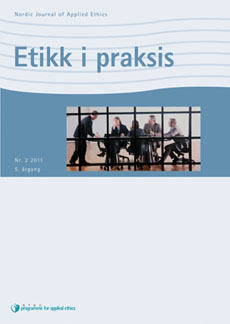Nyeste utgave

Special issue on the work of Vilhjálmur Árnason
Kadri Simm, Bjørn Hofmann, Guest Editors
Leder - Introduction
Artikler - Articles
Åpen del - Open section
 |
Publisert av NTNU Program for anvent etikkk SHERPA/RoMEO green journal Indeksert i DOAJ, Web of Science, EbscoHost, Philosopher's Index og Scopus
Nytt nummerTemanummer om Family ethics
|
|
Invitasjon til bidragNr 2/2020 Special Issue Deadline for submission: May 5, 2020 The Justice of Others: Arbitrary Law-making in Contemporary Migration Policy Does regulation of migration constitute a blunt case of arbitrary law-making? This is the pressing issue that this special issue seeks to engage with by exploring international migration from the point of view of arbitrary power. When does legitimate state discretion slides into an exercise of arbitrary power? Deciding who may enjoy the right to abode, to stay, to asylum, to citizenship is a key power of the state: A regal prerogative, an act of sovereignty, limited only by deliberately accepted commitments, such as the respect for human rights. This makes migration policy an exceptionally interesting ground to test the limits of discretion and the forms of arbitrariness. Power can be understood to be of a discretional nature if it acts freely within the boundaries defined by law, whereas arbitrary qualifies discretional power exceeding the limits of law. Further enquiry is needed if we want to know how this hitherto peripheral and surrogated dimension of legal decision-making stretches the leeway of legal officials to the very margin of legality, disclosing the social tension and the power struggle between their agency and the structures that condition and enable it. As arbitrariness becomes a pressing concern for lawyers, practicians and scholars attempting to grasp the discretionary powers of judicial and administrative authorities, its legal construction, social impact and political consequences must be explored in order to appreciate how central it has become. But arbitrary law-making is yet to garner the attention it deserves. It is not only under-theorized, but also lacks adequate empirical analysis. As of today, there is little or no conversation about arbitrary law-making across disciplines involved with migration, a policy area marked by the recurrent use of discretionary practices in law and practices often conceived to be arbitrary. The special issue aims to bring together practical philosophy, legal theory and social theory in conversation with migration law about the topic of arbitrary law-making in contemporary migration policy. |
||

